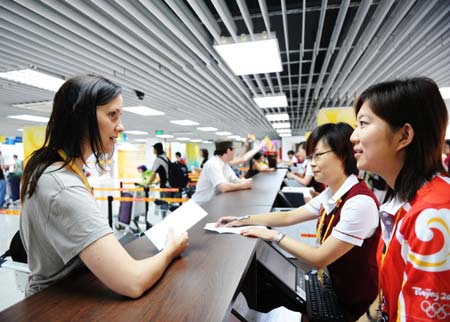 Reporters check in at the Olympic Media Village in Beijing, July 25, 2008. [Xinhua]
Reporters check in at the Olympic Media Village in Beijing, July 25, 2008. [Xinhua] |
At the BIMC website, phone numbers of ministries in China's central government are publicized. At the center, printed manuals about covering news outside Beijing are offered with contacts of local governments and major enterprises.
About 150,000 guides about China and the Games written in 19 languages have been handed out. And the BIMC staff have received and processed more than 200 requests for interviews, half from foreign media.
Although worries about free news reporting are lingering, covering news in China has undergone notable changes.
A regulation on reporting activities in China by foreign media during the Games and the preparatory period has, since January last year, lifted several rules over foreign reporters. They no longer need approval from the local government's foreign affairs department but only agreement from the people or organizations to be interviewed.
Local authorities are urged to cooperate with media even when the interview involves sensitive topics such as environmental protection, AIDS and housing displacement.
They are also cooperating in response to media requests such as to give live report from the Tian'anmen square, China's political symbol, to import satellite news operations, to hire helicopters for shooting and set up cameras in some popular tourists sites.
"We could regard the Olympics as a chance to push the country to open to global media," said Ren Zhanjiang, dean of the Department of Journalism and Communication, China Youth University for Political Sciences.
Some changes will continue after the Games. In April last year, the Chinese government issued a regulation asking administrations to publicize information that the public should learn about. The law on emergency responses, adopted in August 2007, cancelled an item in its draft that banned media from reporting emergencies without permission from the authority.
It was implemented when the devastating May 12 earthquake jolted southwest China. The first news about the earthquake came minutes after tremors were felt while the death toll, which used to be a taboo in disaster news reporting, was announced and updated daily until now. A day later foreign correspondents were reporting news on the earthquake ruins, and continued to do so.